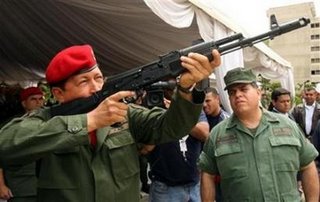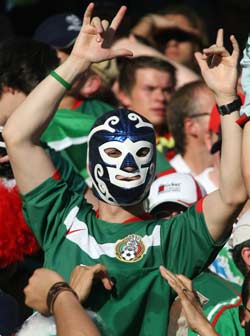

Besides the World Cup action this weekend, hundreds of millions of TV viewers worldwide will also be checking in to an event taking place in Indianapolis, Indiana - which ironically will be seen by even less Americans than the World Cup games. It is the United States Grand Prix a round of the Formula One World Driving Championship. While NASCAR defines racing in the U.S., F1 is widely acknowledged as the pinnacle of motorports: the cars wonders of technology, the drivers the best of the best. As in Soccer, Latin Americans have a long and storied history in the sport from Argentina's Fangio, Mexico's Rodriguez brothers, Brazil's Fittipaldi,Piquet the legendary Senna, Indy 500 and Monaco winner Juan Pablo Montoya a national hero in his native Colombia. But on the technical side, global giants like Renault Mercedes, Honda, and legendary nameplates like Ferrari spend billions fielding the teams- whose world-class personnel design, test, and set-up the space-age machines that capture the imaginations of a global audience.
Unlike the previous six runnings of the U.S. Grand Prix at Indianapolis, for the first time there will be an American driver taking the grid, Scott Speed of Manteca Calfornia. But it will also be the third year that an American company is not fielding a car, after Ford sold its underperforming Jaguar team. And unlike soccer, this is one sport where Americans have reached the pinnacle. Phil Hill and Mario Andretti were both World Driving Champions - the great Daniel Sexton Gurney should have been the third. From the start of the World Championship as we know it in the early 50's, Americans were actively involved in the sport. Drivers like Hill, Ginther, Gurney, Revson, Andretti, wanted to compete against the best, and were willing to go to Europe to pursue their dreams. U.S. companies like Ford and Goodyear invested millions in Formula One and international sports car racing, which was also populated by internationally-minded racer/entrepreneurs like Carrol Shelby and Roger Penske.
At some point the parochialism of some American sports fans and sportswriters caught up with F1. When Mario Andretti returned to U.S. competition F1's popularity in the U.S. declined and the sport failed to find a permanent home. After Mario, Eddy Cheever was the sole American in the series for most of the 80's, and Mario's son Michael had a failed attempt in 93. Many young American drivers simply could not cut it, and others were not willing to go to Europe to make it. As a result even the Indy Car World Series, which like F1 raced on road courses, suffered from a lack of American talent, that was used as an excuse to split what was once a magnificent series. NASCAR, with its Southern roots, over-agressive publicists, and junk car technology, took advantage and wiped everything off the map.
It took an Austrian company to figure it out. The biggest market in the world needed an American driver in the World Championship. Red Bull started a talent search which pitted the best young American drivers -mostly teens- against each other. In addition to pure speed, the drivers were also measured by non-racing criteria such as poise with the media, fitness, and mental attitude. Winners would get the opportunity to move to Europe and a paid ride in the continents minor league racing series - with the promise of continued support all the way up the ladder to Formula One if the performance was there. The competition is structured to mimic the path of todays top Formula One drivers. Stars like current world champ Fernando Alonso and the Finnish prodigy, Kimi Raikkonnenn, honed their skills starting from their teens in the ruthlessly competitive European Karting and ladder series.
So young Scott Speed, who dreamed of Formula One since he was 11, and barely out of his teens was one of the finalists in the Red Bull Search and went to Europe. Unfortunately, a serious intestinal disease almost ended his racing career - not to mention almost having his intestine removed. But he overcame the disease and showed his commitment by remaining in Europe. And under Red Bell's wing (no pun intended) he has succeeded at every level in the ladder, and now has a ride in Squadra Torro Rosso, one of Red Bulls two teams. Mind you, this is among the slowest cars in thei field, the team has no reasonable chances of winning a race. But in F1 where only 22 drivers have full-time seats, good performances in a slow car, can elevate you to the storied top teams like McLaren or Ferrari. Red Bull's "first team" aspires to that elite, and it is considered to be the next step up for any Red Bull driver. And that is what Speed expects to do, to make the waves that will push him into a better ride. It is nice to see this kind of commitment to succeed in what is not an "American" form of competition, but which is a global standard of excellence.
Pretty ironic that it was an Austrian Multi-National that created the conditions for Speed to be running in the USGP. The company is trying to not only win a World Championship, it wants to put an American in the position of winning it. It is banking that it can sell more cans of Red Bull by growing the sport in the US, all the time increasing its brand exposure worldwide. Call it a win-win in a globalized market. By the way, Red Bulls #1 team, used to be the underperforming Jaguar team, which the Ford honchos at Dearborn were just too happy to sell after spending hundreds of millions of dollars.








